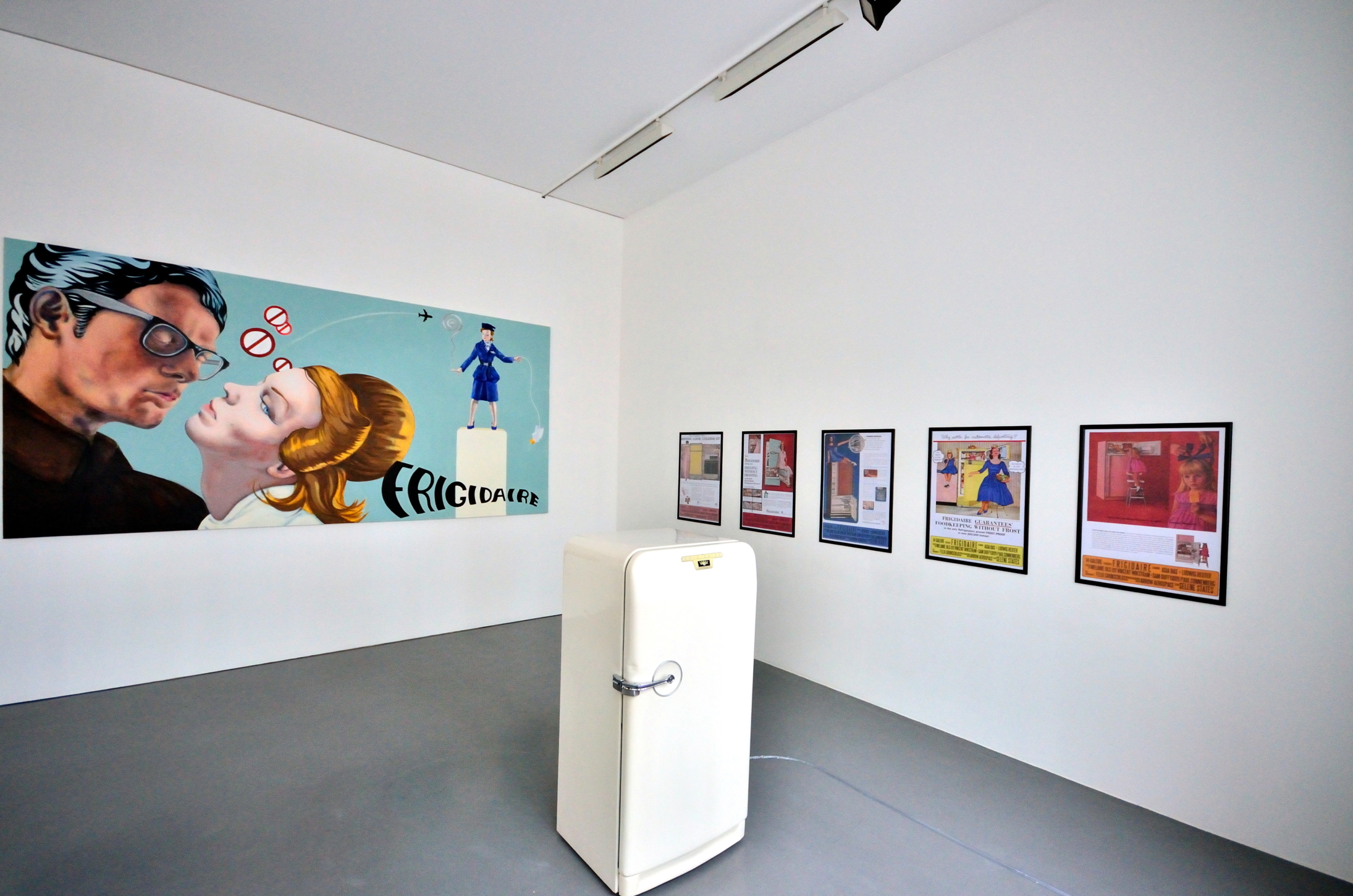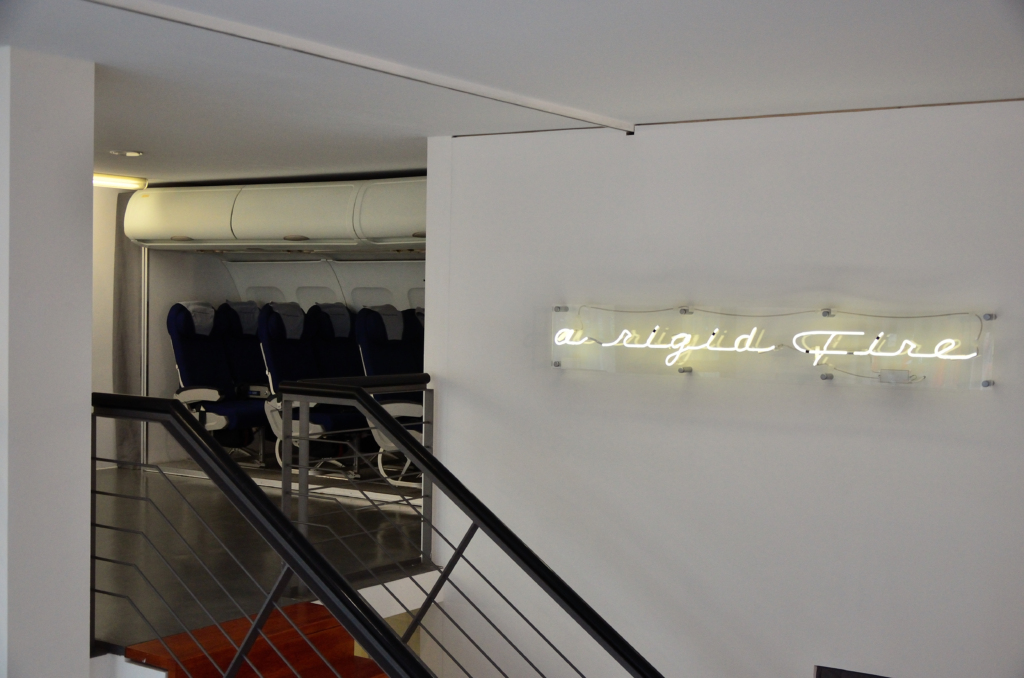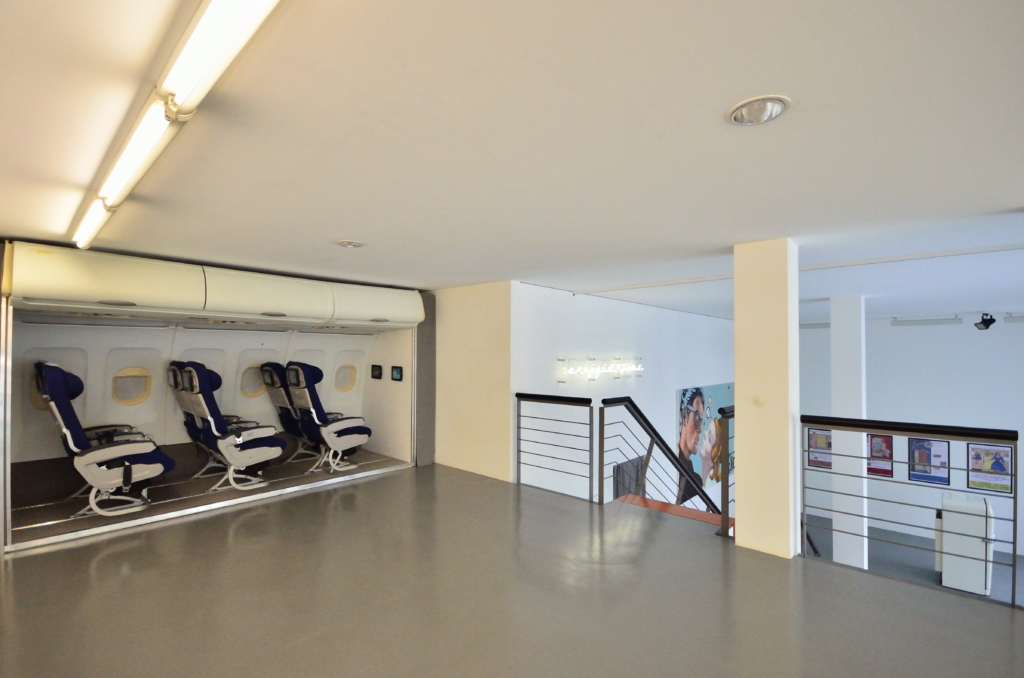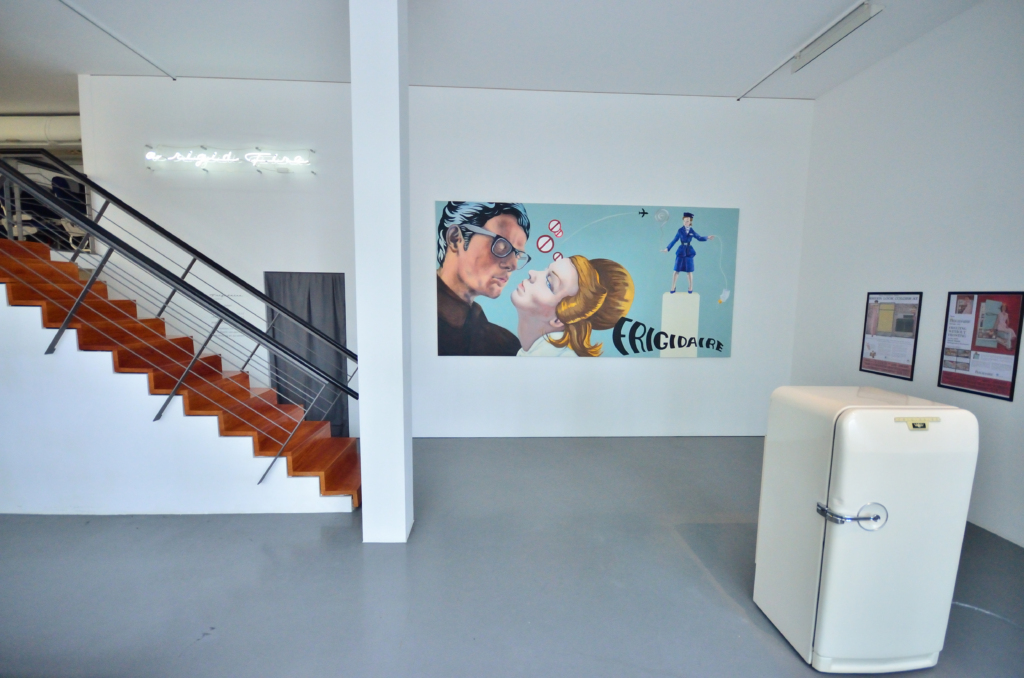Selena States
Frigidaire
When you walk into American artist Selene States’ installation, you’ll feel like you’re in a movie theater: a huge poster painting is displayed on the large side wall—it’s a couple about to kiss, accompanied by the mysterious title Frigidaire. On the right side of the front wall, we discover more posters, including one at the top left of the stairs. And the mysterious title appears again and again: Frigidaire!
But the artist has placed the solution to the riddle right in our midst – in the form of an imposing American refrigerator with the emblem of the same name emblazoned on its door. This electrical appliance, one of the earliest models of the US brand Frigidaire, plays the leading role in our exhibition, which takes a tongue-in-cheek, ironic, critical, and humorous look at how marketing strategies for industrial consumer products and anachronistic role models intertwine. Loaded with social, psychological, and erotic associations and projections, the Frigidaire refrigerator brand, with its nostalgic design and advertising images focused entirely on sensuality, proves to be the ideal object of desire for the modern woman.
We discover this supposedly pleasurable side of housewife life when we climb the stairs to make ourselves comfortable in an airplane cabin. In the commercials shown there, we learn all about the latest models from the Frigidaire brand from 1957. These are refrigerators with the names of sleek limousines and the same attributes that “men” want from the ideal housewife: “exciting,” “elegant,” and, of course, ‘practical’ and “functional.” It is no coincidence that in these films we encounter the young, pretty, elegantly dressed housewife who shows us the latest refrigerator model as if it were a long-awaited dream that has now come true. With tender movements, she opens and closes its doors, strokes its surfaces, and discovers its inner workings, as if she cannot get enough of the sight of it. It is a seductive life in which housework is done at the touch of a button and the housewife dances through the kitchen in her most beautiful dress, freshly coiffed, made up, and wearing high heels—without getting her hands dirty, of course!
In her own version of this seduction story, Selene States takes the manipulative aspect of the wonderful world of advertising to the extreme. In her 36-minute video film, for which she set up her own cinema, a lustful and at the same time manic relationship unfolds between the stewardess Cura and her Frigidaire refrigerator – in competition with a male lover who ends up empty-handed. Cura initially appears in the film as an emancipated young woman who has her own apartment, a good job, and her own independence, and who could actually move around “freely.” In reality, however, she is trapped in a corset of rituals, constraints, and neuroses in which her refrigerator plays a central role. While the contents of a refrigerator usually tempt us out of our sleep with its delicacies, in States’ film it is the appliance itself that has developed seductive qualities. Every time Cura becomes emotionally unbalanced, she seeks out her refrigerator. This creates a relationship of dependency that has distinctly pathological characteristics. The artist creates powerful images to illustrate this: internally—like an animal crawling on the floor—she seeks to escape the seduction of the refrigerator, while in reality she sits smoking on her sofa. As the alluring hum of the refrigerator becomes louder and more insistent, she is no longer able to resist it. She breaks down internally and returns to her refrigerator. Cura seeks to escape this vicious circle by fantasizing herself into a scene in her dreams in which she determines the actions of others. In full possession of her stewardess authority, she shows what she can do in an empty flight cabin: she blossoms as she demonstrates the safety instructions with lascivious movements. But this fantasy of liberation is nipped in the bud when she is almost strangled by her own inflatable life jacket. Remorseful, she returns to her refrigerator. When her lover reappears—perhaps as her last connection to the real world—she ignores him, only to finally surrender to the power of her refrigerator. She empties it, slips inside, and closes the door.
In the film, the Frigidaire is nothing less than a metaphor for an understanding of roles that forces the female protagonist into her limits and lures her into a supposedly sheltered world in which she must make herself small—subordinate to a system in which she is controlled by an obsessive love of order, a mania for cleanliness, and awkwardly performed rituals. However, the artist is not concerned with openly denouncing the patriarchal system and its strategies of discrimination. She plays brilliantly with the seductive qualities of the images produced by this system and reinterprets them in her own way. The stewardess Cura is her role model. She dreams the dream of all big girls and seems to have already fulfilled it: she has a dream job and is traveling the world. Dressed chicly, she struts through her life, which paradoxically remains confined to narrow, almost claustrophobic spaces: her meticulously tidy apartment and the empty airplane cabin. From both, she takes refuge in a compulsive behavior in which reality—and thus also real men—have no place. In order to remain in this fantasy world and avoid facing the real challenges of her everyday life and possibly her relationships, she ultimately retreats into her refrigerator, which promises exactly that: a perhaps somewhat chilly, but perfect and protected existence in a “golden cage” – or, as in the film: the pastel green interior of a refrigerator, which she has even matched to the color of her mint-colored dress.
Selene States ingeniously manages to combine all these aspects in her installation. Frigidaire is a film title, a refrigerator brand, and the name of the airline Cura travels with. By transforming the refrigerator brand into a fictional airline, the artist develops a metaphor for the possibility of shifting and transforming gender definitions. This means that Cura switches between the cool world of her apartment, where she moves as if remote-controlled—frigid, unable to allow feelings and passions—and where she is exposed to the seductions and manipulations of her Frigidaire (meaning “frosty air”). On the other hand, she lives in the world of her flight cabin, where she appears self-confident, sexy, and charming in order to seduce her fictional audience—that is, us. It is no coincidence that the anagram “a rigid fire” lures us upward as neon lettering above the stairs.
Curated by: Dr. Andrea Jahn



